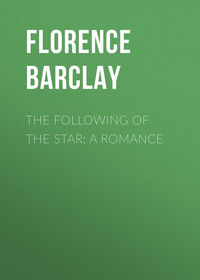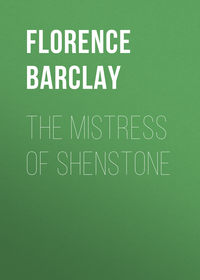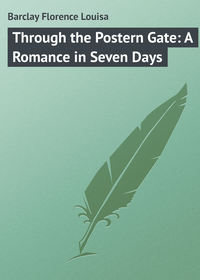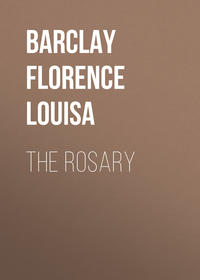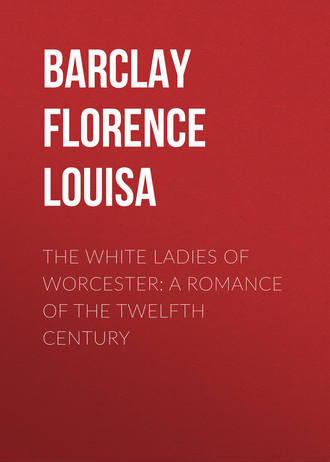 полная версия
полная версияThe White Ladies of Worcester: A Romance of the Twelfth Century

Florence L. Barclay
The White Ladies of Worcester: A Romance of the Twelfth Century
CHAPTER I
THE SUBTERRANEAN WAY
The slanting rays of afternoon sunshine, pouring through stone arches, lay in broad, golden bands, upon the flags of the Convent cloister.
The old lay-sister, Mary Antony, stepped from the cool shade of the cell passage and, blinking at the sunshine, shuffled slowly to her appointed post at the top of the crypt steps, up which would shortly pass the silent procession of nuns returning from Vespers.
Daily they went, and daily they returned, by the underground way, a passage over a mile in length, leading from the Nunnery of the White Ladies at Whytstone in Claines, to the Church of St. Mary and St. Peter, the noble Cathedral within the walls of the city of Worcester.
Entering this passage from the crypt in their own cloisters, they walked in darkness below the sunny meadows, passed beneath the Fore-gate, moving in silent procession under the busy streets, until they reached the crypt of the Cathedral.
From the crypt, a winding stairway in the wall led up to a chamber above the choir, whence, unseeing and unseen, the White Ladies of Worcester daily heard the holy monks below chant Vespers.
To Sister Mary Antony fell the task of counting the five-and-twenty veiled figures, as they passed down the steps and disappeared beneath the ground, and of again counting them as they reappeared, and moved in stately silence along the cloister, each entering her own cell, to spend, in prayer and adoration, the hours until the Refectory bell should call them to the evening meal.
This counting of the White Ladies dated from the day, now more than half a century ago, when Sister Agatha, weakened by prolonged fasting, and chancing to walk last in the procession, fainted and, falling silently, remained behind, unnoticed, in the solitude and darkness.
It was the habit of this saintly lady to abide in her own cell after Vespers, dispensing with the evening meal; thus her absence was not discovered until the following morning when Mary Antony, finding the cell empty, hastened to report that Sister Agatha having long, like Enoch, walked with God, had, even, as Enoch, been translated!
The nuns who flocked to the cell, inclining to Mary Antony's view of the strange happening, kneeled upon the floor before the empty couch, and worshipped.
The Prioress of that time, however, being of a practical turn of mind, ordered the immediate lighting of the lanterns, and herself descended to search the underground way.
She did not need to go far.
The saintly spirit of Sister Agatha had indeed been translated.
They found her frail body lying prone against the door, the hands broken and torn by much wild beating upon its studded panels.
She had run to and fro in the dank darkness, beating first upon the door beneath the Convent cloisters, then upon the door, a mile away, leading into the Cathedral crypt.
But the nuns were shut into their cells, beyond the cloister; the good people of Worcester city slept peacefully, not dreaming of the despairing figure running to and fro beneath them—tottering, stumbling, falling, arising to fall again, yet hurrying blindly onwards; and the Cathedral Sacristan, when questioned, confessed that, hearing cries and rappings coming from the crypt at a late hour, he speedily locked the outer gate, said an "Ave," and went home to supper; well knowing that, at such a time, none save spirits of evil would be wandering below, in so great torment.
Thus, through much tribulation, poor Sister Agatha entered into rest; being held in deepest reverence ever after.
More than fifty years had gone by. The Prioress of that day, and most of those who walked in that procession, had long lain beside Sister Agatha in the Convent burying-ground. But Mary Antony, now oldest of the lay-sisters, never failed to make careful count, as each veiled figure passed, nor to impart the mournful reason for this necessity to all new-comers. So that the nun whose turn it was to walk last in the procession, prayed that she might not hear behind her the running feet of Sister Agatha; while none went alone into the cloisters after dark, lest they should hear the poor thin hands of Sister Agatha beating upon the panels of the door.
Thus does the anguish of a tortured brain leave its imperishable impress upon the surroundings in which the mind once suffered, though the freed spirit may have long forgotten, in the peace of Paradise, that slight affliction, which was but for a moment, through which it passed to the eternal weight of glory.
Of late, the old lay-sister, Mary Antony, had grown fearful lest she should make mistake in this solemn office of the counting. Therefore, in the secret of her own heart, she devised a plan, which she carried out under cover of her scapulary. Twenty-five dried peas she held ready in her wallet; then, as each veiled figure, having mounted the steps leading from the crypt doorway, moved slowly past her, she dropped a pea with her right hand into her left. When all the holy Ladies had passed, if all had returned, five-and-twenty peas lay in her left hand, none remained in the wallet.
This secret dropping of peas became a kind of game to Mary Antony. She kept the peas in a small linen bag, and often took them out and played with them when alone in her cell, placing them all in a row, and settling, to her own satisfaction, which peas should represent the various holy Ladies.
A large white pea, of finer aspect than the rest, stood for the noble Prioress herself; a somewhat shrivelled pea, hard, brown, and wizened, did duty as Mother Sub-Prioress, an elderly nun, not loved by Mary Antony because of her sharp tongue and strict fault-finding ways; while a pale and speckled pea became Sister Mary Rebecca, held in high scorn by the old lay-sister, as a traitress, sneak, and liar, for if ever tale of wrong or shame was whispered in the Convent, it could be traced for place of origin to the slanderous tongue and crooked mind of Sister Mary Rebecca.
When all the peas in line upon the floor of her cell were named, old Mary Antony marked out a distant flagstone, on which the sunlight fell, as heaven; another, partially in shadow, purgatory; a third, in a far corner of exceeding darkness, hell. She then proceeded, with well-directed fillip of thumb and middle finger, to send the holy Ladies there where, in her judgment, they belonged.
If the game went well, the noble Prioress landed safely in heaven, without even the most transitory visit to purgatory; Mother Sub-Prioress, rolling into purgatory, remained there; while the pale and speckled pea went straight to hell!
When these were safely landed, Mary Antony rubbed her hands and, chuckling gleefully, finished the game at gay hap-hazard, it being of less importance where the rest of the holy Ladies chanced to go.
CHAPTER II
SISTER MARY ANTONY DISCOURSES
As Mary Antony shuffled slowly from the shadow into the sunshine, a gay little flutter of wings preceded her, and a robin perched upon the parapet behind the stone seat upon which it was the lay-sister's custom to await the sound of the turning of the key in the lock of the heavy door beneath the cloisters.
"Thou good-for-nothing imp!" exclaimed Mary Antony, her old face crinkling with delight. "Thou little vain man, in thy red jerkin! Beshrew thine impudence, intruding into a place where women alone do dwell, and no male thing may enter. I would have thee take warning by the fate of the baker's boy, who dared to climb into a tree, so that he might peep over the wall and spy upon the holy Ladies in their garden. Boasting afterward of that which he had done, and making merry over that which he pretended to have seen, our great Lord Bishop heard of it, and sent and took that baker's boy, and though he cried for mercy, swearing the whole tale was an empty boast, they put out his bold eyes with heated tongs, and hanged him from the very branches he had climbed. They'd do the like to thee, thou little vain man, if Mary Antony reported on thy ways. Wouldst like to hang, in thy red doublet?"
The robin had heard this warning tale many times already, told by old Mary Antony with infinite variety.
Sometimes the tongue of the baker's boy was cut out at the roots; sometimes he lost his ears, or again, he was tied to a cart-tail, and flogged through the Tything. Often he became a pieman, and once he was a turnspit in the household of the Lord Bishop himself. But, whatever the preliminaries, and whether baker, pieman, or turnspit, his final catastrophe was always the same: he was hanged from a bough of the very tree into which, impious and greatly daring, he had climbed.
This was an ancient tale. All who might vouch for it, saving the old lay-sister, had passed away; and, of late, Mary Antony had been strictly forbidden by the Reverend Mother, to tell it to new-comers, or to speak of it to any of the nuns.
So, daily, she told it to the robin; and he, being neither baker's lad, pieman, nor turnspit, and having a conscience void of offence, would listen, wholly unafraid; then, hopping nearer to Mary Antony, would look up at her, eager inquiry in his bright eyes.
On this particular afternoon he flew up into the very tree climbed by the prying and ill-fated baker's lad, settled on a bough which branched out over the Convent wall, and poured forth a gay trill of song.
"Ha, thou little vain man, in thy brown and red suit!" chuckled Mary Antony, leaning her gnarled hands on the stone parapet, as she stood framed in one of the cloister arches overlooking the garden. "Is that thy little 'grace before meat'? But, I pray thee, Sir Robin, who said there was cheese in my wallet? Nay, is there like to be cheese in a wallet already containing five-and-twenty holy Ladies on their way back from Vespers? Out upon thee for a most irreverent little glutton! I fear me thou hast not only a high look, thou hast also a proud stomach; just the reverse of the great French Cardinal who came, with much pomp, to visit us at Easter time. He had a proud look and a— Come down again, thou little naughty man, and I will tell thee what the Lord Cardinal had under his crimson sash. 'Tis not a thing to shout to the tree-tops. I might have to recite ten Paternosters, if I let thee tempt me so to do. For whispering it in thine ear, I should but say one; for having remarked it, none at all. Facts are facts; and, even in the case of so weighty a fact, the responsibility rests not upon the beholder."
Mary Antony leaned over the parapet, looking upward. The afternoon sunlight fell full upon the russet parchment of her kind old face, shewing the web of wrinkles spun by ninety years of the gently turning wheel of time.
But the robin, perched upon the bough, trilled and sang, unmoved. He was weary of tales of bakers and piemen. He was not at all curious as to what had been beneath the French Cardinal's crimson sash. He wanted the tasty morsels which he knew lay concealed in Sister Mary Antony's leathern wallet. So he stayed on the bough and sang.
The old face, peering up from between the pillars, softened into tenderness at the robin's song.
"I cannot let thy little grace return unto thee void," she said, and fumbled at the fastenings of her wallet.
A flick of wings, a flash of red. The robin had dropped from the bough, and perched beside her.
She doled out crumbs, and fragments of cheese, pushing them toward him along the parapet; leaving her fingers near, to see how close he would adventure to her hand.
She watched him peck a morsel of cheese into five tiny pieces, then fly, with full beak, on eager wing, to the hidden nest, from which five gaping mouths shrieked a shrill and hungry welcome. Then, back again—swift as an arrow from the archer's bow—noting, with bright eye, and head turned sidewise, that the hand resting on the coping had moved nearer; yet brave to take all risks for the sake of those yellow beaks, which would gape wide, in expectation, at sound of the beat of his wings.
"Feed thyself, thou little worldling!" chuckled old Antony, and covered the remaining bits of cheese with her hand. "Who art thou to come here presuming to teach thy betters lessons of self-sacrifice? First feed thyself; then give to the hungry, the fragments that remain. Had I five squealing children here—which Heaven forbid—I should eat mine own mess, and count myself charitable if I let them lick the dish. The holy Ladies give to the poor at the Convent gate, that for which they have no further use. Does thy jaunty fatherhood presume to shame our saintly celibacy? Mother Sub-Prioress did chide me sharply because, to a poor soul with many hungry mouths to feed, I gave a good piece of venison, and not the piece which was tainted. Truth to tell, I had already made away with the tainted piece; but Mother Sub-Prioress was pleased to think it was in the pot, seething for the holy Ladies' evening meal; and wherefore should Mother Sub-Prioress not think as she pleased?
"'Woman!' she cried; 'Woman!'—and when Mother Sub-Prioress says 'Woman!' the woman she addresses feels her estate would be higher had God Almighty been pleased to have let her be the Man, or even the Serpent, so much contempt does Mother Sub-Prioress infuse into the name—'Woman!' said Mother Sub-Prioress, 'wouldst thou make all the Ladies of the Convent ill?'
"'Nay,' said I, 'that would I not. Yet, if any needs must be ill, 'twere easier to tend the holy Ladies in their cells, than the Poor, in humble homes, outside the Convent walls, tossing on beds of rushes.'
"'Tush, fool!' snarled Mother Sub-Prioress. "'The Poor are not easily made ill.'
"Tush indeed! I tell thee, little bright-eyed man, old Antony, can 'tush' to better purpose! That night there were strong purging herbs in the broth of Mother Sub-Prioress. Yet she did but keep her bed for one day. Like the Poor, she is not easily made ill! . . . Well, have thy way; only peck not my fingers, Master Robin, or I will have thee flogged through the Tything at the cart-tail, as was done to a certain pieman, whose history I will now relate.
"Once upon a time, when Sister Mary Antony was young, and fair to look upon—Nay, wink not thy naughty eye–"
At that moment came the sound of a key turning slowly in the lock of the door at the bottom of the steps leading from the crypt to the cloister.
CHAPTER III
THE PRIORESS PASSES
A key turned slowly in the lock of the oaken door at the entrance to the underground way.
The old lay-sister seized her wallet and pulled out the bag of peas.
Below, the heavy door swung back upon its hinges.
Mary Antony dropped upon her knees to the right of the steps, her hands hidden beneath her scapulary, her eyes bent in lowly reverence upon the sunlit flagstones, her lips mumbling chance sentences from the Psalter.
The measured sound of softly moving feet drew near, slightly shuffling as they reached the steps and began to mount, up from the mile-long darkness, into the sunset light.
First to appear was a young lay-sister, carrying a lantern. Hastening up the steps, she extinguished the flame, grown sickly in the sunshine, placed the lantern in a niche, and, dropping upon her knees, opposite old Mary Antony, sought to join in the latter's pious recitations.
"Adhaesit pavimento anima mea," chanted Mary Antony. "Wherefore are the holy Ladies late to-day?"
"One fell to weeping in the darkness," intoned the young lay-sister, "whereupon Mother Sub-Prioress caused all to stand still while she strove, by the light of my lantern held high, to discover who had burst forth with a sob. None shewing traces of tears, she gave me back the lantern, herself walking last in the line, as all moved on."
"Convertentur ad vesperam, and the devil catch the hindmost," chanted Mary Antony, with fervour.
"Amen," intoned Sister Abigail, eyes bent upon the ground; for the tall figure of the Prioress, mounting the steps, now came into view.
The Prioress passed up the cloister with a stately grace of motion which, even beneath the heavy cloth of her white robe, revealed the noble length of supple limbs. Her arms hung by her sides, swaying gently as she walked. There was a look of strength and of restfulness about the long fingers and beautifully moulded hands. Her face, calm and purposeful, was lifted to the sunlight. Suffering and sorrow had left thereon indelible marks; but the clear grey eyes, beneath level brows, were luminous with a light betokening the victory of a pure and noble spirit over passionate and most human flesh.
No sinner, in her presence, ever felt crushed by hopeless weight of sin; no saint, before the gaze of her calm eyes, felt sure of being altogether faultless.
So truly was she woman, that all humanity seemed lifted to her level; so completely was she saint, that sin did slink away abashed before her coming.
They who feared her most, were most conscious of her kindness. They who loved her best, were least able to venture near.
In the first bloom of her womanhood she had left the world, resigning high rank, fair lands, and the wealth which makes for power. Her faith in human love having been rudely shattered, she had sought security in Divine compassion, and consolation in the daily contemplation of the Man of Sorrows. In her cell, on a rough wooden cross, hung a life-size figure of the dying Saviour.
She had not reached her twenty-fifth year when, fleeing from the world, she joined the Order of the White Ladies of Worcester, and passed into the seclusion and outward calm of the Nunnery at Whytstone.
Five years later, on the death of the aged Prioress, she was elected, by a large majority, to fill the vacant place.
She had now, during two years, ruled the Nunnery wisely and well.
She had ruled her own spirit, even better. She had won the victory over the World and the Flesh; there remained but the Devil. The Devil, alas, always remains.
As she moved, with uplifted brow and mien of calm detachment, along the sunlit cloister to the lofty, stone passage, within, the Convent, she was feared by many, loved by most, and obeyed by all.
And, as she passed, old Mary Antony, bowing almost to the ground, dropped a large white pea, from between her right thumb and finger, into the horny palm of her left hand.
Behind the Prioress there followed a nun, tall also, but ungainly. Her short-sighted eyes peered shiftily to right and left; her long nose went on before, scenting possible scandal and wrong-doing; her weak lips let loose a ready smile, insinuating, crafty, apologetic. She walked with hands crossed upon her breast, in attitude of adoration and humility. As she moved by, old Mary Antony let drop the pale and speckled pea.
Keeping their distances, mostly with shrouded faces, bent heads, and folded hands, all the White Ladies passed.
Each went in silence to her cell, there kneeling in prayer and contemplation until the Refectory bell should call to the evening meal.
As the last, save one, went by, the keen eyes of the old lay-sister noted that her hands were clenched against her breast, that she stumbled at the topmost step, and caught her breath with a half sob.
Behind her, moving quickly, came the spare form of the Sub-Prioress, ferret-faced, alert, vigilant; fearful lest sin should go unpunished; wishful to be the punisher.
She must have heard the half-strangled sob burst from the slight figure stumbling up the steps before her, had not old Mary Antony been suddenly moved at that moment to uplift her voice in a cracked and raucous "Amen."
Startled, and vexed at being startled, the Sub-Prioress turned upon Mary Antony.
"Peace, woman!" she said. "The Convent cloister is not a hen-yard. Such ill-timed devotion well-nigh merits penance. Rise from thy knees, and go at once about thy business."
The Sub-Prioress hastened on.
Scowling darkly, old Antony bent forward, looking, past Mother Sub-Prioress, up the cloister to the distant passage.
Sister Mary Seraphine had reached her cell. The door was shut.
Old Antony's knees creaked as she arose, but her wizened face was once more cheerful.
"Beans in her broth to-night," she said. "One for 'woman'; another for the hen-yard; a third for threatening penance when I did but chant a melodious 'Amen.' I'll give her beans—castor beans!"
Down the steps she went, pushed the heavy door to, locked it, and drew forth the key; then turned her steps toward the cell of the Reverend Mother.
On her way thither, she paused at a certain door and listened, her ear against the oaken panel. Then she hurried onward, knocked upon the door of the Reverend Mother's cell and, being bidden to enter, passed within, closed the door behind her, and dropped upon her knees.
The Prioress stood beside the casement, gazing at the golden glory of the sunset. She was, for the moment, unconscious of her surroundings. Her mind was away behind those crimson battlements.
Presently she turned and saw the old woman, kneeling at the door.
"How now, dear Antony?" she said, kindly. "Get up! Hang the key in its appointed place, and make me thy report. Have all returned? As always, is all well?"
The old lay-sister rose, hung the massive key upon a nail; then came to the feet of the Prioress, and knelt again.
"Reverend Mother," she said, "all who went forth have returned. But all is not well. Sister Mary Seraphine is uttering wild cries in her cell; and much I fear me, Mother Sub-Prioress may pass by, and hear her."
The face of the Prioress grew stern and sad; yet, withal, tender. She raised the lay-sister, and gently patted the old hands which trembled.
"Go thy ways, dear Antony," she said. "I myself will visit the little Sister in her cell. None will attempt to enter while I am there."
CHAPTER IV
"GIVE ME TENDERNESS," SHE SAID
The Prioress knelt before a marble group of the Virgin and Child, placed where the rays of evening sunshine, entering through the western casement, played over its white beauty, shedding a radiance on the pure face of the Madonna, and a halo of golden glory around the Infant Christ.
"Mother of God," prayed the Prioress, with folded hands, "give me patience in dealing with wilfulness; grant me wisdom to cope with unreason; may it be given me to share the pain of this heart in torment, even as—when thou didst witness the sufferings of thy dear Son, our Lord, on Calvary—a sword pierced through thine own soul also.
"Give me this gift of sympathy with suffering, though the cross be not mine own, but another's.
"But give me firmness and authority: even as when thou didst say to the servants at Cana: 'Whatsoever He saith unto you, do it.'"
The Prioress waited, with bowed head.
Then, of a sudden she put forth her hand, and touched the marble foot of the Babe.
"Give me tenderness," she said.
CHAPTER V
THE WAYWARD NUN
Sister Mary Seraphine lay prone upon the floor of her cell.
Tightly clenched in her hands were fragments of her torn veil.
She beat her knuckles upon the stones with rhythmic regularity; then, when her arms would lift no longer, took up the measure with her toes, in wild imitation of a galloping horse.
As she lay, she repeated with monotonous reiteration: "Trappings of crimson, and silver bells: mane and tail, like foam of the waves; a palfrey as white as snow!"
The Prioress entered, closed the door behind her, and looked searchingly at the prostrate figure; then, lifting the master-key which hung from her girdle, locked the door on the inside.
Sister Mary Seraphine had been silent long enough to hear the closing and locking of the door.
Now she started afresh.
"Trappings of crimson, and silver bells–"
The Prioress walked over to the narrow casement, and stood looking out at the rosy clouds wreathing a pale green sky.
"Oh! . . . Oh! . . . Oh! . . ." wailed Sister Mary Seraphine, writhing upon the floor; "mane and tail, like foam of the waves; a palfrey as white as snow!"
The Prioress watched the swallows on swift wing, chasing flies in the evening light.
So complete was the silence, that Sister Mary Seraphine—notwithstanding that turning of the key in the lock—fancied she must be alone.


